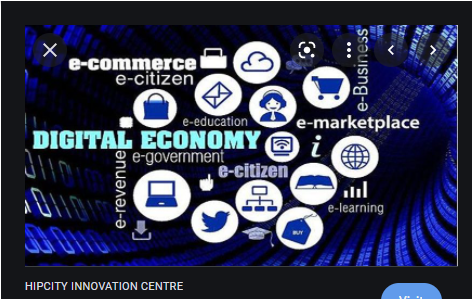Digital Economy Policy applauded by senior citizens
By Jeph Ajobaju, Chief Copy Editor
A Nigeria Startup Bill (NSB) is in the works to facilitate the digital economy by setting rules and incentives for tech-based enterprises in which especially youths are active, selling goods and services on social media.
Digital Transformation Presidential Assistant Oswald Guobadia disclosed the plan at a hackathon challenge organised in Abuja by Financial Services Innovators (FSI).
The event was organised in collaboration with the Nigerian Association of Computing Students (NACOS) for select students in the six zones.
NSB “puts guidelines in place to help facilitate funding through a number of different ways. There are funds available to staffers and small businesses but the bill will help to give a pathway for you to go to access it,” Guobadia said.
“The bill will serve as a one-stop-shop. It is basically a startup management system where all startups would be registered and from that platform you will be able to access all the information as relates to the startup as long as you qualify for it.”
__________________________________________________________________
Related articles:
Entrepreneurs count N30b losses in Nigeria’s Twitter ban
Abuja raises $4b in Eurobond. Buhari floats tax on ‘all digital transactions’ to service debt
Housing Scheme creating 250,000 jobs, says Osinbajo
__________________________________________________________________
Financial Services Innovators (FSI) Executive Director Aituaz Kola-Oladejo said the aim of the summit is to raise leaders and create a culture of innovation which in turn will help reduce unemployment, per The Nation.
His words: “The summit is for young people who are interested in building a career in technology, and also who are interested in becoming entrepreneurs.
“This programme is the maiden edition to help them on their path, provide guidance that is required, and also to help them commercialise their solutions and innovations.
“FSI is a platform for social infrastructure that aids young people who don’t have a voice but have ideas. We are in a mission to discover talents in the Nigerian tech ecosystem, and especially in tertiary institutions because that’s where the idea starts from.
“We want to help them refine and provide that level of guidance, give them access to a network of mentors, and at the end of the day commercialise it.”
‘Social media is where I eat’
Many businesses now rely heavily on social media such as WhatsApp and Instagram to relate with customers, evidenced by the consequences of the ban President Muhammadu Buhari imposed on Twitter on June 4.
Buhari announced in his October 1 broadcast that he has directed the lifting of the ban on Twitter based on certain conditions – which are still being worked out.
Reuters reports that an entrepreneur based in Lagos, Ogechi Egemonu, was selling more than N500,000 ($1,219) worth of watches, shoes and handbags on Twitter per week before the ban.
Now, with the site suspended by the government, Egemonu does not know how she will cope.
“Social media is where I eat,” she told Reuters. “I depend on social media for my livelihood.”
Scores of small and medium-sized businesses across Africa’s most populous nation – and largest economy – are reeling from the suspension of the social media site.
The suspension of Twitter came two days after the platform removed a post from Buhari that threatened to punish regional separatists. Most telecommunications sites have since blocked access.
Up to 40 million Nigerians use Twitter – 20 per cent of them for business advertisement and 18 per cent to look for employment.
Experts warn its lack of ready availability – it is accessible using Virtual Private Networks (VPNs) that mask location – could ripple across the economy.
Senior citizens applaud Digital Economy Policy
National Senior Citizens Centre (NSCC) Director General Emem Omokaro has commended Buhari for his “inclusive” Digital Economy Policy and Strategy 2020 to 2030.
He said this will transform Nigeria into a leading digital economy that will provide quality of life for all as well as build a nation where digital innovation and entrepreneurship will create value for all.
In his view, the eight pillars of the policy align with the National Senior Citizens Centre Act and the National Policy on Ageing which emphasise training, including digital literacy, and enhanced capacities of senior citizens.
The policy also stresses creating innovative income initiatives, work schemes, health, sports, recreation, and building a data base for senior citizens, Omokaro said in a statement issued through NSCC Public Affairs, Media and Communications Head, Omini Oden, reported by The Nation.
“Digital technologies which, at the speed of light, continue to liberate face to face interactions and to create on-line sources, means and platforms for transactions and social connections in all aspects of life, should be universally accessed,” he added.
These include e-health care-doctors on call; e-commerce, online shopping, online banking, online working, help-call lines; e-learning, e-conferences, vital registration portals among others with unfettered transformative impact.
Omokaro expressed optimism that Nigeria is embracing a comprehensive vision that protects the human rights of older persons, which entail universal access to services, including digital technology eco-system for active and equal participation in governance, enjoyment of benefits, and economic growth opportunities.
The NSCC urged “the global community to advocate an end to ageism and its assumptions, prejudices, exclusion and promote optimistic view of older persons’ latent transformative potentials as well as their continuing participation and enhanced capacities, including creating opportunities for digital literacy and skills, to navigate emerging digital environments without barriers.”







